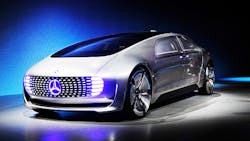It has four wheels, is always connected and the driver is optional: the car of the future is starting to take shape from collaboration between automakers and their technology partners.
At this week's Consumer Electronics Show in Las Vegas, a new breed of cars with nearly complete autonomy and elaborate gadgetry has provided a peek into transportation solutions in the coming years.
One of the most ambitious of the prototypes on display comes from German auto giant Daimler (IW 1000/16), which rolled its electric-powered Mercedes-Benz F 015 through the streets of Las Vegas without a driver to show how four occupants can converse face-to-face while leaving the driving to an on-board computer.
The interactivity extends beyond the vehicle itself: the car can project a virtual crosswalk to assist pedestrians in its path.
"Obviously we talked about autonomous cars before. We have shown that we can do it and we dominate the technology" Daimler chief Dieter Zetsche said in an interview with AFP.
"But now this is more than technology. We want to show where mobility goes all together and the two most important things that we're giving people back: space and time. So they can focus on whatever they want to do, working, relaxing, video conferencing, sleeping."
Moving Beyond Fear
The auto and technology firms at the Las Vegas show have been demonstrating what is possible even if it's not clear whether the public is ready.
While Google is working on a fully autonomous car, other automakers are taking a more gradual approach, focusing on things such as self-parking and crash avoidance technology.
"We have what we know can be done technically and what the public is ready to accept," said Guillaume Devauchelle, vice president for research at French auto equipment firm Valeo (IW 1000/285).
The notion of a fully autonomous car is "scary," Devauchelle says. "What we are trying to do is build confidence in functions which are simple and less expensive."
Valeo demonstrated some of this by taking journalists on a ride through Las Vegas in a Volkswagen Passat equipped with its Cruise4U technology, which allows a driver to use an autopilot mode for steering, accelerating and braking, as well as to avoid collisions.
Valeo sees systems like these coming into service by 2017, but Devauchelle said it may take several generations of vehicles before we see automation in more complex driving situations.
Audi (IW 1000/59) meanwhile used its prototype to navigate 550 miles from northern California to Las Vegas.
Daniel Lipinski, project leader for highway pilot at Audi of America, also cautions about moving too fast on the technology.
Even with autonomous vehicles, he said, "there will be some sort of supervision to make sure the driver is able to take over."
Ford (IW 500/6) meanwhile is promoting "semi-autonomous" cars with assistance on certain functions.
"We're already manufacturing and selling semi-autonomous vehicles that use software and sensors to steer into both parallel and perpendicular parking spaces, adjust speed based on traffic flow or apply the brakes in an emergency," said Raj Nair, Ford chief technical officer.
Connecting to Web, Wearables
Another key theme is the connected car. Some are connecting not only to smartphones, tablets and the Internet but to wearables such as smartwatches.
South Korea's Hyundai (IW 1000/46) introduced an Android Wear watch that connects to its Blue Link system to start or stop the engine, lock or unlock the doors and the driver can say "find my car" to locate the vehicle in a parking lot.
And BMW (IW 1000/31) showed a system to use a television to lock one's car doors.
Zetsche said these innovations are examples of small steps being taken and that "fully autonomous will be in the next decade."
Copyright Agence France-Presse, 2015
About the Author
Agence France-Presse
Copyright Agence France-Presse, 2002-2025. AFP text, photos, graphics and logos shall not be reproduced, published, broadcast, rewritten for broadcast or publication or redistributed directly or indirectly in any medium. AFP shall not be held liable for any delays, inaccuracies, errors or omissions in any AFP content, or for any actions taken in consequence.
